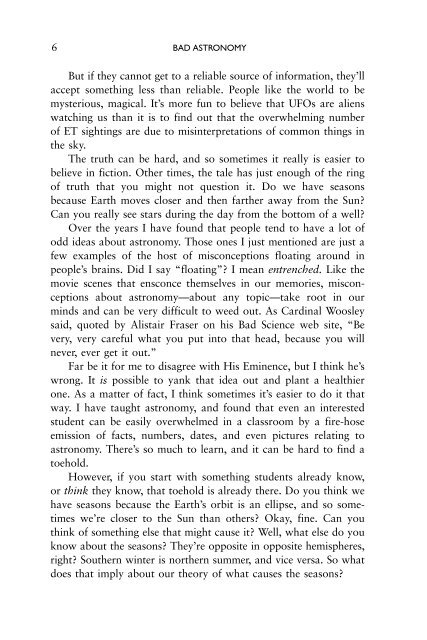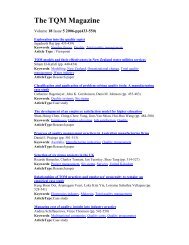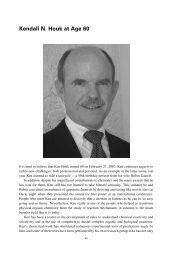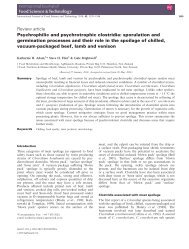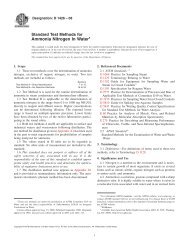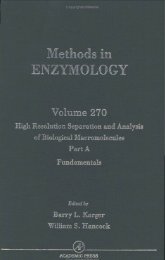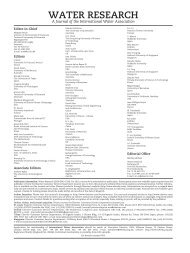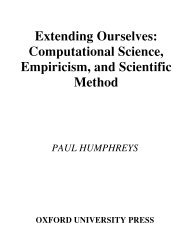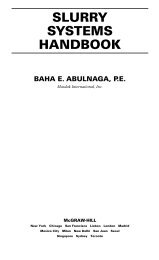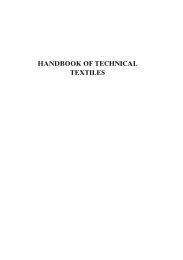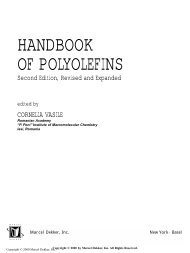- Page 2: Bad Astronomy PPPPPPPPPPPPPPPPPPPPP
- Page 6 and 7: Bad Astronomy PPPPPPPPPPPPPPPPPPPPP
- Page 8 and 9: CONTENTS Introduction 1 PART I Bad
- Page 10: CONTENTS vii Recommended Reading 25
- Page 13 and 14: 2 BAD ASTRONOMY luminous, against a
- Page 15: 4 BAD ASTRONOMY who fully well knew
- Page 20 and 21: PART I PPPPPP Bad Astronomy Begins
- Page 22 and 23: 1 PPPPPP The Yolk’s on You: Egg B
- Page 24 and 25: THE YOLK’S ON YOU 13 and they mak
- Page 26 and 27: THE YOLK’S ON YOU 15 ished announ
- Page 28 and 29: THE YOLK’S ON YOU 17 Of course it
- Page 30 and 31: THE YOLK’S ON YOU 19 with the wea
- Page 32 and 33: 2 PPPPPP Flushed with Embarrassment
- Page 34 and 35: FLUSHED WITH EMBARRASSMENT 23 much
- Page 36 and 37: FLUSHED WITH EMBARRASSMENT 25 Equat
- Page 38 and 39: FLUSHED WITH EMBARRASSMENT 27 still
- Page 40 and 41: IDIOM’S DELIGHT 29 press my heigh
- Page 42 and 43: IDIOM’S DELIGHT 31 friend about w
- Page 44 and 45: IDIOM’S DELIGHT 33 Incidentally,
- Page 46: IDIOM’S DELIGHT 35 So you might c
- Page 49 and 50: 38 FROM THE EARTH TO THE MOON and t
- Page 51 and 52: 40 FROM THE EARTH TO THE MOON body
- Page 53 and 54: 42 FROM THE EARTH TO THE MOON red l
- Page 55 and 56: 44 FROM THE EARTH TO THE MOON top o
- Page 57 and 58: 46 FROM THE EARTH TO THE MOON photo
- Page 59 and 60: 5 PPPPPP A Dash of Seasons: Why Sum
- Page 61 and 62: 50 FROM THE EARTH TO THE MOON Clear
- Page 63 and 64: 52 FROM THE EARTH TO THE MOON Equat
- Page 65 and 66: 54 FROM THE EARTH TO THE MOON Howev
- Page 67 and 68:
56 FROM THE EARTH TO THE MOON the S
- Page 69 and 70:
58 FROM THE EARTH TO THE MOON These
- Page 71 and 72:
60 FROM THE EARTH TO THE MOON the d
- Page 73 and 74:
62 FROM THE EARTH TO THE MOON That
- Page 75 and 76:
7 PPPPPP The Gravity of the Situati
- Page 77 and 78:
66 FROM THE EARTH TO THE MOON is co
- Page 79 and 80:
68 FROM THE EARTH TO THE MOON a poi
- Page 81 and 82:
70 FROM THE EARTH TO THE MOON you
- Page 83 and 84:
72 FROM THE EARTH TO THE MOON Moon,
- Page 85 and 86:
74 FROM THE EARTH TO THE MOON that
- Page 87 and 88:
76 FROM THE EARTH TO THE MOON galax
- Page 89 and 90:
78 FROM THE EARTH TO THE MOON that
- Page 91 and 92:
80 FROM THE EARTH TO THE MOON exact
- Page 93 and 94:
82 FROM THE EARTH TO THE MOON The P
- Page 95 and 96:
84 FROM THE EARTH TO THE MOON But n
- Page 97 and 98:
86 FROM THE EARTH TO THE MOON of th
- Page 99 and 100:
88 SKIES AT NIGHT ARE BIG AND BRIGH
- Page 101 and 102:
90 SKIES AT NIGHT ARE BIG AND BRIGH
- Page 103 and 104:
92 SKIES AT NIGHT ARE BIG AND BRIGH
- Page 105 and 106:
94 SKIES AT NIGHT ARE BIG AND BRIGH
- Page 107 and 108:
96 SKIES AT NIGHT ARE BIG AND BRIGH
- Page 109 and 110:
98 SKIES AT NIGHT ARE BIG AND BRIGH
- Page 111 and 112:
100 SKIES AT NIGHT ARE BIG AND BRIG
- Page 113 and 114:
102 SKIES AT NIGHT ARE BIG AND BRIG
- Page 115 and 116:
104 SKIES AT NIGHT ARE BIG AND BRIG
- Page 117 and 118:
106 SKIES AT NIGHT ARE BIG AND BRIG
- Page 119 and 120:
108 SKIES AT NIGHT ARE BIG AND BRIG
- Page 121 and 122:
110 SKIES AT NIGHT ARE BIG AND BRIG
- Page 123 and 124:
112 SKIES AT NIGHT ARE BIG AND BRIG
- Page 125 and 126:
114 SKIES AT NIGHT ARE BIG AND BRIG
- Page 127 and 128:
13 PPPPPP Shadows in the Sky: Eclip
- Page 129 and 130:
118 SKIES AT NIGHT ARE BIG AND BRIG
- Page 131 and 132:
120 SKIES AT NIGHT ARE BIG AND BRIG
- Page 133 and 134:
122 SKIES AT NIGHT ARE BIG AND BRIG
- Page 135 and 136:
124 SKIES AT NIGHT ARE BIG AND BRIG
- Page 137 and 138:
126 SKIES AT NIGHT ARE BIG AND BRIG
- Page 139 and 140:
128 SKIES AT NIGHT ARE BIG AND BRIG
- Page 141 and 142:
130 SKIES AT NIGHT ARE BIG AND BRIG
- Page 143 and 144:
132 SKIES AT NIGHT ARE BIG AND BRIG
- Page 145 and 146:
134 SKIES AT NIGHT ARE BIG AND BRIG
- Page 147 and 148:
136 SKIES AT NIGHT ARE BIG AND BRIG
- Page 149 and 150:
138 SKIES AT NIGHT ARE BIG AND BRIG
- Page 151 and 152:
140 SKIES AT NIGHT ARE BIG AND BRIG
- Page 153 and 154:
16 PPPPPP When the Universe Throws
- Page 155 and 156:
144 SKIES AT NIGHT ARE BIG AND BRIG
- Page 157 and 158:
146 SKIES AT NIGHT ARE BIG AND BRIG
- Page 159 and 160:
148 SKIES AT NIGHT ARE BIG AND BRIG
- Page 161 and 162:
150 SKIES AT NIGHT ARE BIG AND BRIG
- Page 164 and 165:
PART IV PPPPPPP Artificial Intellig
- Page 166 and 167:
17 PPPPPP Appalled at Apollo: Uncov
- Page 168 and 169:
APPALLED AT APOLLO 157 My question
- Page 170 and 171:
APPALLED AT APOLLO 159 Admittedly,
- Page 172 and 173:
APPALLED AT APOLLO 161 These belts
- Page 174 and 175:
APPALLED AT APOLLO 163 solid-state
- Page 176 and 177:
APPALLED AT APOLLO 165 However, you
- Page 178 and 179:
APPALLED AT APOLLO 167 flow well be
- Page 180 and 181:
APPALLED AT APOLLO 169 One of the m
- Page 182 and 183:
APPALLED AT APOLLO 171 The shadows
- Page 184 and 185:
APPALLED AT APOLLO 173 they put tog
- Page 186 and 187:
WORLDS IN DERISION 175 Many people
- Page 188 and 189:
WORLDS IN DERISION 177 Today, we wo
- Page 190 and 191:
WORLDS IN DERISION 179 do now for t
- Page 192 and 193:
WORLDS IN DERISION 181 This premise
- Page 194 and 195:
WORLDS IN DERISION 183 Venus’ orb
- Page 196 and 197:
WORLDS IN DERISION 185 or mainstrea
- Page 198 and 199:
19 PPPPPP In the Beginning: Creatio
- Page 200 and 201:
IN THE BEGINNING 189 want to believ
- Page 202 and 203:
IN THE BEGINNING 191 squarely at th
- Page 204 and 205:
IN THE BEGINNING 193 tem started ou
- Page 206 and 207:
IN THE BEGINNING 195 it’s natural
- Page 208 and 209:
( a.) ( b.) ( c.) IN THE BEGINNING
- Page 210 and 211:
IN THE BEGINNING 199 their lives, e
- Page 212 and 213:
IN THE BEGINNING 201 ence isn’t l
- Page 214 and 215:
MISIDENTIFIED FLYING OBJECTS 203 la
- Page 216 and 217:
MISIDENTIFIED FLYING OBJECTS 205 In
- Page 218 and 219:
MISIDENTIFIED FLYING OBJECTS 207 an
- Page 220 and 221:
MISIDENTIFIED FLYING OBJECTS 209 Ne
- Page 222 and 223:
MISIDENTIFIED FLYING OBJECTS 211 ni
- Page 224 and 225:
MARS IS IN THE SEVENTH HOUSE 213 Th
- Page 226 and 227:
MARS IS IN THE SEVENTH HOUSE 215 as
- Page 228 and 229:
MARS IS IN THE SEVENTH HOUSE 217 Mi
- Page 230 and 231:
MARS IS IN THE SEVENTH HOUSE 219 of
- Page 232 and 233:
PART V PPPPPP Beam Me Up We’ve tr
- Page 234 and 235:
22 PPPPPP Hubble Trouble: Hubble Sp
- Page 236 and 237:
HUBBLE TROUBLE 225 The Hubble Space
- Page 238 and 239:
HUBBLE TROUBLE 227 A DROP IN THE BU
- Page 240 and 241:
HUBBLE TROUBLE 229 for space telesc
- Page 242 and 243:
HUBBLE TROUBLE 231 staking your sci
- Page 244 and 245:
HUBBLE TROUBLE 233 also used to say
- Page 246 and 247:
HUBBLE TROUBLE 235 can assure you t
- Page 248 and 249:
STAR HUSTLERS 237 That’s a tall o
- Page 250 and 251:
STAR HUSTLERS 239 the names aren’
- Page 252 and 253:
STAR HUSTLERS 241 I’ll note that
- Page 254 and 255:
STAR HUSTLERS 243 The star “Phili
- Page 256 and 257:
24 PPPPPP Bad Astronomy Goes Hollyw
- Page 258 and 259:
BAD ASTRONOMY GOES HOLLYWOOD 247 ar
- Page 260 and 261:
BAD ASTRONOMY GOES HOLLYWOOD 249 si
- Page 262 and 263:
BAD ASTRONOMY GOES HOLLYWOOD 251 it
- Page 264 and 265:
BAD ASTRONOMY GOES HOLLYWOOD 253 Tr
- Page 266 and 267:
BAD ASTRONOMY GOES HOLLYWOOD 255 In
- Page 268:
BAD ASTRONOMY GOES HOLLYWOOD 257 Si
- Page 271 and 272:
260 RECOMMENDED READING with the ma
- Page 273 and 274:
262 RECOMMENDED READING One of the
- Page 275 and 276:
264 ACKNOWLEDGMENTS Vergano, for gi
- Page 277 and 278:
266 INDEX “Astrology: Science or
- Page 279 and 280:
268 INDEX earthquakes, 130, 182 pla
- Page 281 and 282:
270 INDEX Islam, 58-59 “It’s Sp
- Page 283 and 284:
272 INDEX neutrons, 34 in stars, 98
- Page 285 and 286:
274 INDEX Sirius, 100, 107 size con
- Page 287 and 288:
276 INDEX triangles, 148 true scien


